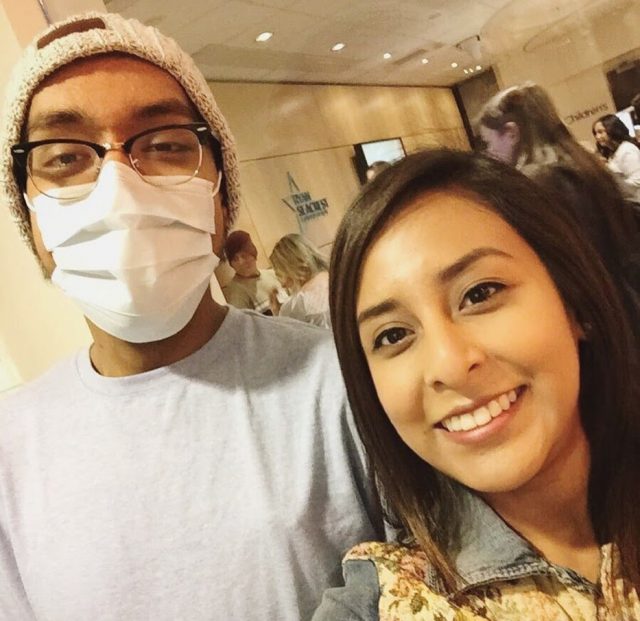Adolescents and young adults with cancer face a unique set of challenges, particularly when it comes to isolation. The physical, emotional, and social effects of cancer can make it difficult for them to maintain connections with their peers, leading to feelings of loneliness and isolation. This can be a difficult experience for any young person, but it can be especially challenging for those going through cancer treatment. And the health risks of feeling lonely and isolated are the equivalent of smoking 15 cigarettes a day. We owe it to each other to do what we can to reduce the impact of isolation and help avoid this added health risk. It will improve the quality of life and health outcomes for those in our community touched by cancer.
Social isolation can be felt in many ways
Here are some examples of social isolation that young adults with cancer and their support communities may experience:
- Physical isolation: The physical isolation that can come with cancer treatment can be especially difficult for adolescents and young adults. They may be unable to attend school or work or miss out on activities they previously enjoyed. This can cause them to feel disconnected from their peers and social networks. Additionally, the physical side effects of treatment can be distressing and make it difficult for them to maintain relationships.
- Emotional isolation: Many adolescents and young adults with cancer may feel ashamed or embarrassed about their diagnosis and may be reluctant to share their experiences with others. They may also feel guilty for not being able to participate in activities with their friends, which can lead to feelings of isolation.
- Social isolation: Adolescents and young adults with cancer may feel socially isolated due to their peers’ lack of understanding of their condition. They may feel left out of social activities and events and struggle to maintain friendships during treatment.
Isolation felt by the support community.
The social support network can also feel physically, emotionally, and socially isolated. They may feel helpless and unsure of how to support their loved one undergoing cancer treatment. They usually have to take time off work or school or work longer hours to care for their loved one while still tending to their other responsibilities. Supporters may feel disconnected from their own friends and colleagues, feeling that life is passing them by.
With dual responsibilities, they often feel like they have no time to recharge or care for themselves. They may feel angry, frustrated, or left out but unable to express their emotions for fear of coming off as selfish or inconsiderate. Even the healthcare team and support staff can feel isolated due to the demanding nature of their work and the emotional toll of supporting patients with cancer. If you know someone who is caring for a loved one with cancer, whether it is a friend, family member, classmate, student, or work colleague, be sure to keep these challenges in mind and offer support authentic to your relationship.
The importance of staying connected.
Isolation and its effects can differ for each individual, and it is crucial to address and support those experiences. Staying connected can make a big difference, and having a support system of friends and family can provide a sense of normalcy and help them feel less alone in their experience. Additionally, being able to talk openly and honestly about their feelings and experiences can be a powerful way to feel heard, understood, and supported.
Technology can also play a role in staying connected for adolescents and young adults with cancer. Social media and messaging apps can provide a way for them to keep in touch with friends and family, even when they are unable to physically be together. Be mindful of what is said online and recognize that the fear of missing out is a very real issue during cancer treatment. Posts about parties, social gatherings, and other events can amplify the sense that the social network is moving on and they are being left behind. Online support groups can also provide a sense of community and a place for them to connect with others who understand what they are going through.
Another important way to stay connected is by connecting with healthcare professionals and support services. Adolescents and young adults with cancer may benefit from talking with a counselor or therapist who can provide emotional support and guidance. Additionally, support groups specifically for young people with cancer can provide a sense of community and a way to connect with others who are going through similar experiences.
Find Excuses to Connect
In episode 22 of The Support Report with b-present podcast, our guest Richard Lee Thai emphasizes that loneliness is a common feeling and social health is a skill to cultivate. During his conversation with co-hosts Justin Peters and Chiara Riga, he offers several helpful strategies that focus on creating the conditions to make meaningful connections easier, including having better conversations, observing the fear ladder, using connection cards, and much more.
Ways to provide support
Supporting people who feel isolated can be challenging, but there are several ways to provide support. Remember, everyone’s experience with isolation is different, and what works for one person may not work for another. Be open and willing to adjust your approach if needed. Here are some ways to support people who feel isolated:
- Listen actively: Try to understand the other person’s perspective. This can help to build understanding and trust.
- Be present: Be available to talk or simply be there to hold their hand. Your presence can be a great source of comfort and support.
- Communicate: Encourage the person to communicate their feelings and thoughts. This can help them to feel heard and understood.
- Offer practical help: Drive them to appointments, help with grocery shopping, or prepare meals. These are all helpful examples.
- Connect them with resources: Share online support groups, community organizations, or counseling services that can provide additional support.
- Show your support: Gestures such as sending a note or gift or giving them a call can help to validate their feelings and provide a sense of understanding.
- Maintain contact: Make an effort to maintain contact through regular phone calls, text messages, or visits.
- Be patient and understanding: Remember that isolation is a process that takes time to overcome. Be patient and understanding in your support and approach.
Isolation can have a significant impact on the experience of adolescents and young adults with cancer, but by staying connected, you can make a big difference in their experience. Friends and family can provide a sense of normalcy and emotional support, technology can provide a way to stay in touch, and healthcare professionals and support services can provide guidance and community. Keep in mind that staying connected is an ongoing process, and be patient and understanding when supporting a friend with cancer.




